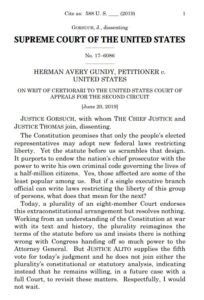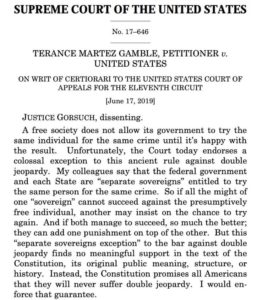In March the Connecticut Supreme Court, over a dissent from three of its seven justices, ruled that the federal Protection of Lawful Commerce in Arms Act (PLCAA) did not pre-empt a state unfair-trade-practice statute for purposes of allowing suits against the maker of the rifle used in the Sandy Hook massacre — this even though the firearm in question was never marketed or sold to the killer, who stole it from his mother who had purchased it lawfully long before. As expected, gunmaker Remington has now filed a certiorari petition to the U.S. Supreme Court, asking for a ruling clarifying the scope of the federal law.
The Cato Institute together with the Independent Institute has filed an amicus brief in the case [Trevor Burrus, Cato] urging the high court to review the Connecticut decision and accord the intended broad effect to Congress’s pre-emption of state litigation intended to achieve gun control by other means.
The brief emphasizes two lines of argument that I find exactly to the point. First, under the right circumstances, the workings of tort lawsuits can impinge on individual rights guaranteed by the Constitution: exorbitant libel verdicts can menace freedom of speech, and similarly stretching of tort and public nuisance law can endanger Second Amendment rights. It is worth making explicit the parallels between the Supreme Court’s acknowledgment of the first in New York Times v. Sullivan and Congress’s recognition of the second in its passage of PLCAA.
It is noteworthy that in both cases the line-drawing came in response to litigation campaigns intended to challenge, or chip away at, the rights in question. By organizing costly libel suits against defendants that included the New York Times, some Southern partisans hoped to silence voices critical of the status quo in their part of the country (and deter others). Decades later, advocates of gun control teamed up with government officials in a litigation campaign intended to force the firearms industry into negotiations by threatening it with bankruptcy through litigation costs, whether it won or lost its cases.
Writes David Kopel: “In both cases, the stakes are the same: whether the Supreme Court will allow the misuse of tort suits to destroy an enumerated right.” What the Supreme Court is being asked to do in this case, namely give effect to Congressional intention in a statutory interpretation case, is less ambitious and far-reaching than what it was asked to do in Sullivan, namely craft entirely new Constitutional law to respond to the problem.


